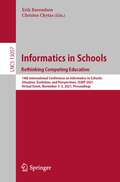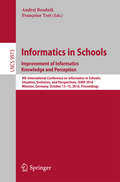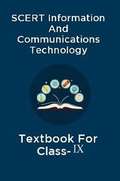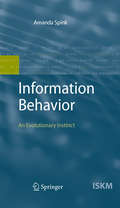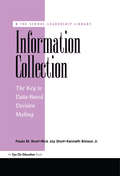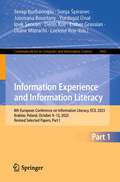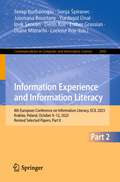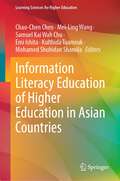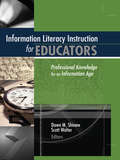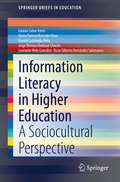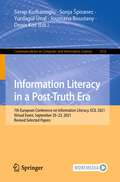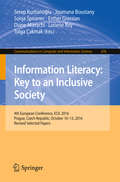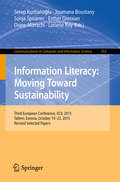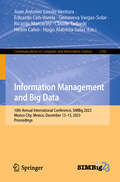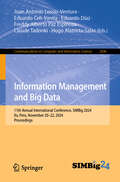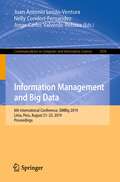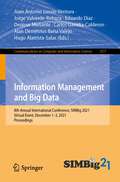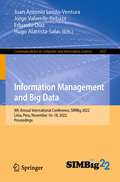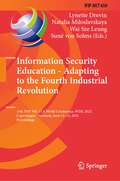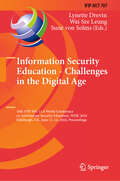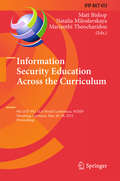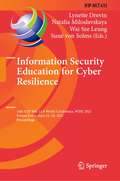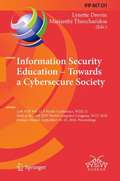- Table View
- List View
Informatics in Schools. Rethinking Computing Education: 14th International Conference on Informatics in Schools: Situation, Evolution, and Perspectives, ISSEP 2021, Virtual Event, November 3–5, 2021, Proceedings (Lecture Notes in Computer Science #13057)
by Erik Barendsen Christos ChytasThis book constitutes the proceedings of the 14th International Conference on Informatics in Schools: Situation, Evolution and Perspectives, ISSEP 2021, held in Nijmegen, The Netherlands, in November 2020. Due to COVID-19 related travelling restrictions the conference had to be switched to online format. The 12 full papers presented were carefully reviewed and selected from 29 submissions. They are organized in topical sections named: Fostering Computational Thinking, Programming Education, Advancing Computing Education, and Teachers’ Professional Development.
Informatics in Schools: Improvement of Informatics Knowledge and Perception
by Andrej Brodnik Françoise TortThis book constitutes the refereed proceedings of the 9th International Conference on Informatics in Schools: Situation, Evolution, and Perspectives, ISSEP 2016, held in M#65533;nster, Germany, in October 2015. The 17 full papers presented together with 1 invited talk were carefully reviewed and selected from 50 submissions. The focus of the conference was on following topics: sustainable education in informatics for pupils of all ages; connecting informatics lessons to the students' everyday lives; teacher education in informatics or computer science; and research on informatics or computer science in schools (empirical/qualitative/quantitative/theory building/research methods/comparative studies/transferability of methods and results from other disciplines).
Information & Communication Technology class 8 - S.C.E.R.T. Kerala Board
by State Council of Educational Research and TrainingInformation & Communication Technology text book for 8th standard from State Council of Educational Research and Training (S.C.E.R.T.) Kerala in English.
Information & Communications Technology Part 1 class 10 - S.C.E.R.T. - Kerala Board
by Training State Council of Educational ResearchInformation and Communications Technology (ICT) does not have much history to claim compared to other subjects. However, in terms of features and applications, it has become widespread. It has brought extensive and fascinating changes in the field of Science and in all walks of our life. We make use of ICT in almost all the subjects that we study, be it Mathematics, Science or Social Science. You have to analyse and interpret the exercises given in these chapters. It is necessary that we should develop new insights on the multiple application of ICT in different fields. This textbook has been prepared keeping in mind the above need and taking into consideration the scope of this branch of Science in enriching the quality of curricular and co-curricular activities.
Information & Communications Technology Part 2 class 9 - S.C.E.R.T. - Kerala Board
by State Council of Educational Research TrainingThe Information and Communications Technology (ICT) textbook for Standard IX is prepared and presented to you with the firm conviction that the ICT textbook for Std VIII could successfully guide you across the marvellous and ever advancing world of information and communications technology, providing you with various innovative learning experiences. This textbook has been prepared with the intention of providing you with practice in using graphic software for designing posters and pictures by yourself for curricular and extracurricular activities, familiarizing you with the various possibilities of word processor, equipping you to use software like spreadsheet, presentation, etc. for doing various activities including projects. The textbook also initiates you into the world of computer languages by providing opportunities to prepare programs using Python. In addition to familiarising the various services provided through Internet, the textbook also offers practice in handling Wiki software.
Information Behavior
by Amanda SpinkInformation behavior has emerged as an important aspect of human life, however our knowledge and understanding of it is incomplete and underdeveloped scientifically. Research on the topic is largely contemporary in focus and has generally not incorporated results from other disciplines. In this monograph Spink provides a new understanding of information behavior by incorporating related findings, theories and models from social sciences, psychology and cognition. In her presentation, she argues that information behavior is an important instinctive sociocognitive ability that can only be fully understood with a highly interdisciplinary approach. The leitmotivs of her examination are three important research questions: First, what is the evolutionary, biological and developmental nature of information behavior? Second, what is the role of instinct versus environment in shaping information behavior? And, third, how have information behavior capabilities evolved and developed over time? Written for researchers in information science as well as social and cognitive sciences, Spink's controversial text lays the foundation for a new interdisciplinary theoretical perspective on information behavior that will not only provide a more holistic framework for this field but will also impact those sciences, and thus also open up many new research directions.
Information Collection
by Paula Short Kenneth Brinson, Jnr Rick ShortThis book describes the various strategies and procedures for collecting, analyzing, and organizing information to improve education.
Information Experience and Information Literacy: 8th European Conference on Information Literacy, ECIL 2023, Kraków, Poland, October 9–12, 2023, Revised Selected Papers, Part I (Communications in Computer and Information Science #2042)
by Serap Kurbanoğlu Joumana Boustany Sonja Špiranec Esther Grassian Diane Mizrachi Loriene Roy Yurdagül Ünal Denis Kos İpek ŞencanThe two-volume set CCIS 2042 and 2043 constitutes the refereed proceedings of the 8th European Conference on Information Literacy, ECIL 2023, held in Kraków, Poland, in October 2023.The 47 full papers presented in these proceedings were carefully reviewed and selected from 182 submissions. The papers have been organized in the following topical sections: algorithms, artificial intelligence and information literacy; data literacy and digital literacy; information experience and information behaviour; policy, strategies, frameworks, research and different approaches; credibility, ethics, challenges and new paths; and information literacy instruction and education.
Information Experience and Information Literacy: 8th European Conference on Information Literacy, ECIL 2023, Kraków, Poland, October 9–12, 2023, Revised Selected Papers, Part II (Communications in Computer and Information Science #2043)
by Serap Kurbanoğlu Joumana Boustany Sonja Špiranec Esther Grassian Diane Mizrachi Loriene Roy Yurdagül Ünal Denis Kos İpek ŞencanThe two-volume set CCIS 2042 and 2043 constitutes the refereed proceedings of the 8th European Conference on Information Literacy, ECIL 2023, held in Kraków, Poland, in October 2023.The 47 full papers presented in these proceedings were carefully reviewed and selected from 182 submissions. The papers have been organized in the following topical sections: algorithms, artificial intelligence and information literacy; data literacy and digital literacy; information experience and information behaviour; policy, strategies, frameworks, research and different approaches; credibility, ethics, challenges and new paths; and information literacy instruction and education.
Information Literacy Education of Higher Education in Asian Countries (Learning Sciences for Higher Education)
by Samuel Kai Wah Chu Kulthida Tuamsuk Emi Ishita Mei-Ling Wang Chao-Chen Chen Mohamed Shuhidan ShamilaThis book focuses on information literacy in higher education from Asian countries. It explores the changing concepts, philosophies, learning environments, and technological environments of information literacy and discusses how information literacy education in universities should be carried out in the context of the information literacy framework. It also analyses the research focus and trends of information literacy education in universities in the past ten years worldwide and Asia by using the bibliometric method as well as the information literacy education models of universities in Asian countries. In addition, this book also explains the current status of information literacy education and related issues in Taiwan, Japan, Hong Kong, Malaysia, Thailand and Vietnam.The target audience of this book is mainly university librarians, school librarians, the faculty and students of library and information sciences, information education and technology education related departments worldwide.
Information Literacy Instruction for Educators: Professional Knowledge for an Information Age
by Scott Walter Dawn ShinewMuch-needed guidance for updating your teaching skills and practices! Information Literacy Instruction for Educators: Professional Knowledge for an Information Age explores various methods of instructing pre-service teachers and administrators on how to locate new subject matter and distinguish between fact, opinion, and rhetoric across a
Information Literacy in Higher Education: A Sociocultural Perspective (SpringerBriefs in Education)
by Fabiola Cabra-Torres Gloria Patricia Marciales Vivas Harold Castañeda-Peña Jorge Winston Barbosa-Chacón Leonardo Melo González Oscar Gilberto Hernández SalamancaThis book presents an innovative theoretical and methodological approach to study information literacy in higher education contexts. While mainstream studies tend to see information literacy as a technical and universal process, this book proposes a theoretical and methodological framework to study information literacy from a sociocultural perspective, highlighting the importance of the social and cultural contexts in which information literacy develops.This situated approach demands that research data must be analysed in relation to the contexts in which they emerge, so the book proposes a research method based on the study of personal histories and stories, learning situations and intersubjective relationships to characterize the different information profiles of different information users. Adopting a multidisciplinary approach that combines contributions from educational research, psychology and information sciences, the authors first present a theoretical discussion to argue in favor of the sociocultural paradigm to study information literacy, then present their methodological proposal to observe informational competencies among higher education students, and finally present the results of an empirical study to identify different information literacy profiles among Latin American students and teachers.Breaking with the hegemonic paradigm in the field, Information Literacy in Higher Education – A Sociocultural Perspective provides useful and innovative tools to researchers working in different areas of the social sciences, such as education, psychology, linguistics and information sciences.
Information Literacy in a Post-Truth Era: 7th European Conference on Information Literacy, ECIL 2021, Virtual Event, September 20–23, 2021, Revised Selected Papers (Communications in Computer and Information Science #1533)
by Serap Kurbanoğlu Joumana Boustany Sonja Špiranec Yurdagül Ünal Denis KosThis book constitutes the refereed post-conference proceedings of the 7th European Conference on Information Literacy, ECIL 2021, held in online mode in September 2021.The 61 revised papers included in this volume were carefully reviewed and selected from 192 submissions. The papers are organized in the topical sections on information literacy in a post-truth era and news literacy; health literacy; data literacy; digital literacy and digital empowerment; other literacies; information literacy in different contexts; information literacy education in different sectors; information literacy instruction; assessment and evaluation of information literacy; academic integrity, plagiarism and digital piracy; information behaviour; information literacy, libraries and librarians; information literacy in different cultures and countries; information literacy and democracy, citizenship, active participation.
Information Literacy: Key to an Inclusive Society
by Serap Kurbanoğlu Joumana Boustany Sonja Špiranec Esther Grassian Diane Mizrachi Loriene Roy Tolga ÇakmakThis book constitutes revised selected papers from the 4th European Conference on Information Literacy, ECIL 2016, held in Prague, Czech Republic, in October 2016. The 52 full and 19 short papers presented in this volume were carefully reviewed and selected from 259 submissions. They were organized in topical sections named: inclusive society and democracy; employability and workplace; various literacies; reading preference: print vs electronic; theoretical aspects; higher education; discipline based studies; research methods; children and youth; country based studies; academic libraries; librarians; and teaching methods and instruction.
Information Literacy: Third European Conference, ECIL 2015, Tallinn, Estonia, October 19-22, 2015, Revised Selected Papers (Communications in Computer and Information Science #552)
by Serap Kurbanoğlu Joumana Boustany Sonja Špiranec Esther Grassian Diane Mizrachi Loriene RoyThis book constitutes the refereed proceedings of the Third European Conference on Information Literacy, ECIL 2015, held in Tallinn, Estonia, in October 2015. The 61 revised full papers presented were carefully reviewed and selected from 226 submissions. The papers are organized in topical sections on information literacy, environment and sustainability; workplace information literacy and knowledge management; ICT competences and digital literacy; copyright literacy; other literacies; information literacy instruction; teaching and learning information literacy; information literacy, games and gamification; information need, information behavior and use; reading preference: print vs electronic; information literacy in higher education; scholarly competencies; information literacy, libraries and librarians; information literacy in different context.
Information Management and Big Data: 10th Annual International Conference, SIMBig 2023, Mexico City, Mexico, December 13–15, 2023, Proceedings (Communications in Computer and Information Science #2142)
by Juan Antonio Lossio-Ventura Hugo Alatrista-Salas Hiram Calvo Genoveva Vargas-Solar Eduardo Ceh-Varela Ricardo Marcacini Claude TadonkiThis book constitutes the refereed proceedings of the 10th Annual International Conference on Information Management and Big Data, SIMBig 2023, held in Mexico City, Mexico, during December 13–15, 2023. The 19 full papers and 6 short papers included in this book were carefully reviewed and selected from 64 submissions. SIMBig 2023 introduced innovative approaches for analyzing and handling datasets as well as new methods based on Artificial Intelligence (AI), Data Science, Machine Learning, Natural Language Processing, Semantic Web, Data-driven Software Engineering, Health Informatics, and more.
Information Management and Big Data: 11th Annual International Conference, SIMBig 2024, Ilo, Peru, November 20–22, 2024, Proceedings (Communications in Computer and Information Science #2496)
by Juan Antonio Lossio-Ventura Hugo Alatrista-Salas Eduardo Díaz Eduardo Ceh-Varela Claude Tadonki Freddy Paz EspinozaThis book constitutes the proceedings of the 11th Annual International Conference on Information Management and Big Data, SIMBig 2024, held in Ilo, Peru, during November 20–22, 2024. The 27 full papers and 1 short paper included in this book were carefully reviewed and selected from 102 submissions. They were organized in topical sections as follows: machine learning and deep learning; natural language processing; mining of social networks and online platforms; and signal and image processing.
Information Management and Big Data: 6th International Conference, SIMBig 2019, Lima, Peru, August 21–23, 2019, Proceedings (Communications in Computer and Information Science #1070)
by Juan Antonio Lossio-Ventura Nelly Condori-Fernandez Jorge Carlos Valverde-RebazaThis book constitutes the refereed proceedings of the 6th International Conference on Information Management and Big Data, SIMBig 2019, held in Lima, Peru, in August 2019.The 15 full papers and 16 short papers presented were carefully reviewed and selected from 104 submissions. The papers address issues such as data mining, artificial intelligence, Natural Language Processing, information retrieval, machine learning, web mining.
Information Management and Big Data: 8th Annual International Conference, SIMBig 2021, Virtual Event, December 1–3, 2021, Proceedings (Communications in Computer and Information Science #1577)
by Juan Antonio Lossio-Ventura Hugo Alatrista-Salas Denisse Muñante Eduardo Díaz Jorge Valverde-Rebaza Carlos Gavidia-Calderon Alan Demétrius Baria ValejoThis book constitutes the refereed proceedings of the 8th International Conference on Information Management and Big Data, SIMBig 2021, held as a virtual event in December 2021. The 25 revised full papers and 2 revised short papers presented were carefully reviewed and selected from 67 submissions. The papers are organized in topical sections on data mining and applications; deep learning and applications; data-driven software engineering; health, NLP, and social media; image processing, machine learning, and semantic web.
Information Management and Big Data: 9th Annual International Conference, SIMBig 2022, Lima, Peru, November 16–18, 2022, Proceedings (Communications in Computer and Information Science #1837)
by Juan Antonio Lossio-Ventura Hugo Alatrista-Salas Eduardo Díaz Jorge Valverde-RebazaThis book constitutes the refereed proceedings of the 9th Annual International Conference on Information Management and Big Data, SIMBig 2022, held in Lima, Peru, during November 16–18, 2022.The 18 full papers and 1 short paper included in this book were carefully reviewed and selected from 50 submissions. The volume presented novel methods for the analysis and management of large data, in fields like Artificial Intelligence (AI), Data Science, Machine Learning, Natural Language Processing, Semantic Web, Data-driven Software Engineering, Health Informatics.
Information Security Education - Adapting to the Fourth Industrial Revolution: 15th IFIP WG 11.8 World Conference, WISE 2022, Copenhagen, Denmark, June 13–15, 2022, Proceedings (IFIP Advances in Information and Communication Technology #650)
by Natalia Miloslavskaya Lynette Drevin Suné Von Solms Wai Sze LeungThis book constitutes the refereed proceedings of the 15th IFIP WG 11.8 World Conference on Information Security Education, WISE 2022, held in Copenhagen, Denmark, in June 2021. The 8 papers presented were carefully reviewed and selected from 17 submissions. The papers are categorized into the following topical sub-headings: Securing the Fourth Industrial Revolution through Programming; Cybersecurity in the Fourth Industrial Revolution: Charting the Way Forward in Education; and Real-World Cybersecurity-Inspired Capacity Building.
Information Security Education - Challenges in the Digital Age: 16th IFIP WG 11.8 World Conference on Information Security Education, WISE 2024, Edinburgh, UK, June 12–14, 2024, Proceedings (IFIP Advances in Information and Communication Technology #707)
by Lynette Drevin Suné Von Solms Wai Sze LeungThis book constitutes the refereed proceedings of the 16th IFIP WG 11.8 World Conference on Information Security Education on Information Security Education Challenges in the Digital Age, WISE 2024, held in Edinburgh, UK, during June 12–14, 2024. The 13 papers presented were carefully reviewed and selected from 23 submissions. The papers are organized in the following topical sections: cybersecurity training and education; enhancing awareness; digital forensics and investigation; cybersecurity programs and career development.
Information Security Education Across the Curriculum: 9th IFIP WG 11.8 World Conference, WISE 9, Hamburg, Germany, May 26-28, 2015, Proceedings (IFIP Advances in Information and Communication Technology #453)
by Matt Bishop Natalia Miloslavskaya Marianthi TheocharidouThis book constitutes the refereed proceedings of the 9th IFIP WG 11.8 World Conference on Security Education, WISE 9, held in Hamburg, Germany, in May 2015. The 11 revised papers presented together with 2 invited papers were carefully reviewed and selected from 20 submissions. They are organized in topical sections on innovative methods, software security education, tools and applications for teaching, and syllabus design.
Information Security Education for Cyber Resilience: 14th IFIP WG 11.8 World Conference, WISE 2021, Virtual Event, June 22–24, 2021, Proceedings (IFIP Advances in Information and Communication Technology #615)
by Natalia Miloslavskaya Lynette Drevin Suné Von Solms Wai Sze LeungThis book constitutes the refereed proceedings of the 14th IFIP WG 11.8 World Conference on Information Security Education, WISE 14, held virtually in June 2021.The 8 papers presented together with a special chapter showcasing the history of WISE and two workshop papers were carefully reviewed and selected from 19 submissions. The papers are organized in the following topical sections: a roadmap for building resilience; innovation in curricula; teaching methods and tools; and end-user security.
Information Security Education – Towards a Cybersecure Society: 11th IFIP WG 11.8 World Conference, WISE 11, Held at the 24th IFIP World Computer Congress, WCC 2018, Poznan, Poland, September 18–20, 2018, Proceedings (IFIP Advances in Information and Communication Technology #531)
by Marianthi Theocharidou Lynette DrevinThis book constitutes the refereed proceedings of the 11th IFIP WG 11.8 World Conference on Information Security Education, WISE 11, held at the 24th IFIP World Computer Congress, WCC 2018, in Poznan, Poland, in September 2018.The 11 revised papers presented were carefully reviewed and selected from 25 submissions. They focus on cybersecurity and are organized in the following topical sections: information security learning techniques; information security training and awareness; and information security courses and curricula.
